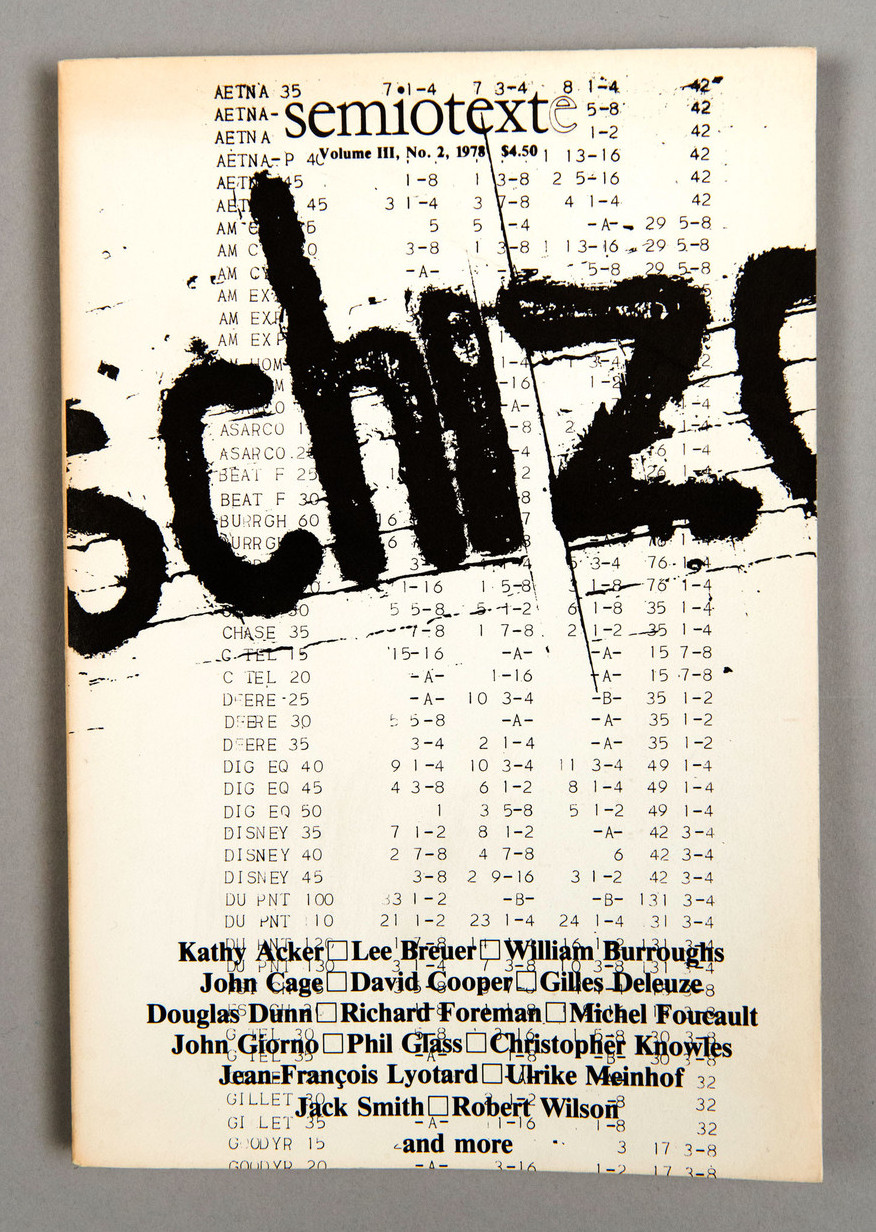Semiotext(e), 3(2): Schizo-Culture (1978)
Filed under journal | Tags: · anti-psychiatry, capitalism, linguistics, literature, philosophy, politics, power, psychoanalysis, schizoanalysis, schizophrenia, semiotics

“Semiotext(e) began in 1974 as a journal started by French philosopher Sylvère Lotringer in an effort to bridge radical French theory and the intellectual and art worlds of New York City. The original editorial board included ten people, mostly graduate students at Columbia University where Lotringer teaches, who chipped in fifty dollars apiece to get the journal started. They held their first conference in 1975: the Schizo-Culture conference on prisons and madness. Speakers included Gilles Deleuze, Félix Guattari, Michel Foucault, and Jean-François Lyotard, now all staples of the Semiotext(e) backlist.” (from Wikipedia)
With contributions by Kathy Acker, Lee Breuer, William Burroughs, John Cage, David Cooper, Gilles Deleuze, Douglas Dunn, Richard Foreman, Michel Foucault, John Giorno, Phil Glass, Christopher Knowles, Jean-Francois Lyotard, Ulrike Meinhof, Jack Smith, Robert Wilson, and others.
Edited by Sylvère Lotringer
Publisher Semiotext(e), New York, 1978
ISSN 00939579
221 pages
PDF (8 MB, updated on 2013-12-8)
See also Semiotext(e), 3(1): Nietzsche’s Return (1978).
Comments (2)Jodi Dean: Democracy and Other Neoliberal Fantasies: Communicative Capitalism and Left Politics (2009)
Filed under book | Tags: · capitalism, communicative capitalism, democracy, left, neoliberalism, politics

“Democracy and Other Neoliberal Fantasies is an impassioned call for the realization of a progressive left politics in the United States. Through an assessment of the ideologies underlying contemporary political culture, Jodi Dean takes the left to task for its capitulations to conservatives and its failure to take responsibility for the extensive neoliberalization implemented during the Clinton presidency. She argues that the left’s ability to develop and defend a collective vision of equality and solidarity has been undermined by the ascendance of “communicative capitalism,” a constellation of consumerism, the privileging of the self over group interests, and the embrace of the language of victimization. As Dean explains, communicative capitalism is enabled and exacerbated by the Web and other networked communications media, which reduce political energies to the registration of opinion and the transmission of feelings. The result is a psychotic politics where certainty displaces credibility and the circulation of intense feeling trumps the exchange of reason.
Dean’s critique ranges from her argument that the term democracy has become a meaningless cipher invoked by the left and right alike to an analysis of the fantasy of free trade underlying neoliberalism, and from an examination of new theories of sovereignty advanced by politicians and left academics to a look at the changing meanings of “evil” in the speeches of U.S. presidents since the mid-twentieth century. She emphasizes the futility of a politics enacted by individuals determined not to offend anyone, and she examines questions of truth, knowledge, and power in relation to 9/11 conspiracy theories. Dean insists that any reestablishment of a vital and purposeful left politics will require shedding the mantle of victimization, confronting the marriage of neoliberalism and democracy, and mobilizing different terms to represent political strategies and goals.”
Publisher Duke University Press, 2009
ISBN 0822345056, 9780822345053
217 pages
PDF (updated on 2020-5-31)
Comment (0)Félix Guattari: The Anti-Œdipus Papers (2006)
Filed under book | Tags: · body without organs, capitalism, desiring machines, deterritorialization, philosophy, production, psychoanalysis, schizoanalysis, schizophrenia, semiotics

“‘The unconscious is not a theatre, but a factory,’ wrote Gilles Deleuze and Félix Guattari in Anti-Oedipus (1972), instigating one of the most daring intellectual adventures of the last half-century. Together, the well-known philosopher and the activist-psychiatrist were updating both psychoanalysis and Marxism in light of a more radical and ‘constructivist’ vision of capitalism: ‘Capitalism is the exterior limit of all societies because it has no exterior limit itself. It works well as long as it keeps breaking down.’
Few people at the time believed, as they wrote in the often-quoted opening sentence of Rhizome, that ‘the two of us wrote Anti-Oedipus together.’ They added, ‘Since each of us was several, that became quite a crowd.’ These notes, addressed to Deleuze by Guattari in preparation for Anti-Oedipus, and annotated by Deleuze, substantiate their claim, finally bringing out the factory behind the theatre. They reveal Guattari as an inventive, highly analytical, mathematically-minded ‘conceptor,’ arguably one of the most prolific and enigmatic figures in philosophy and sociopolitical theory today. The Anti-Oedipus Papers (1969-1973) are supplemented by substantial journal entries in which Guattari describes his turbulent relationship with his analyst and teacher Jacques Lacan, his apprehensions about the publication of Anti-Oedipus and accounts of his personal and professional life as a private analyst and codirector with Jean Oury of the experimental clinic Laborde (created in the 1950s).”
Edited by Stéphane Nadaud
Translated by Kélina Gotman
Publisher Semiotext(e), 2006
Foreign Agents series
ISBN 1584350318, 9781584350316
437 pages
PDF (updated on 2017-6-26)
Comment (0)
